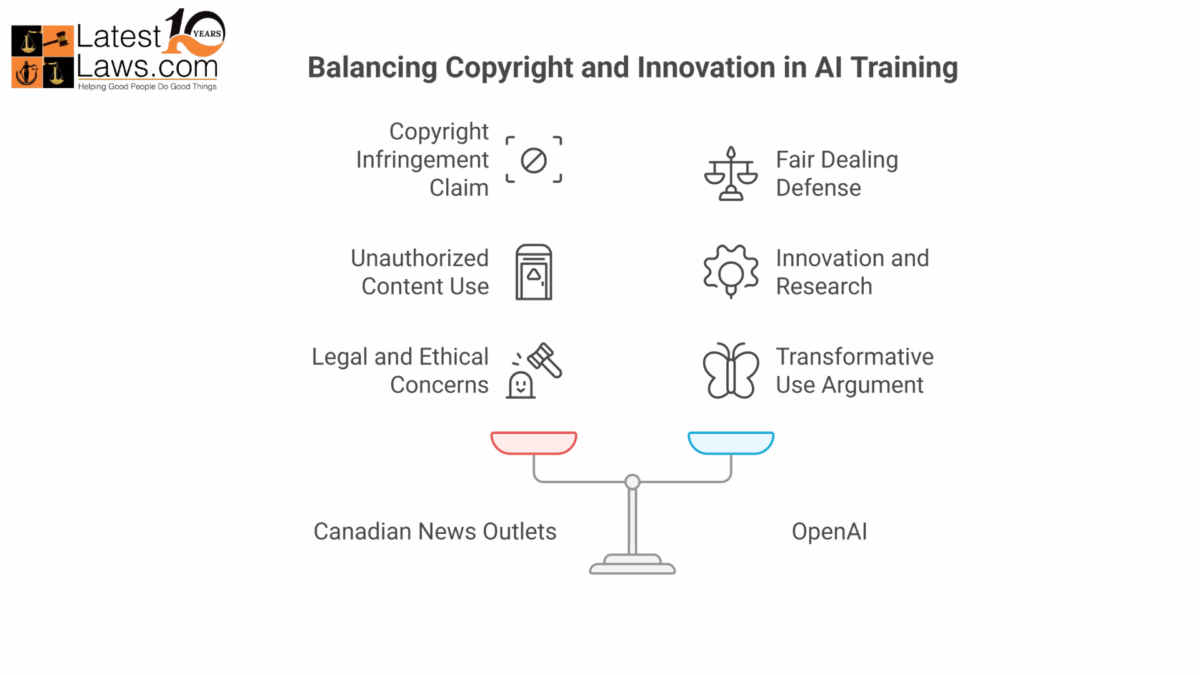ChatGPT in the Copyright Crossfire: Canadian News Giants Sue OpenAI Over AI Training Practices

In a landmark legal move, five of Canada’s largest and most influential news organizations have filed a copyright infringement lawsuit against OpenAI—the creator of ChatGPT. The case, filed in late November 2024, accuses OpenAI of unauthorized use of protected content to train its AI models, with potential damages running into billions of dollars.
Read this: Audi’s “Q6” Trademark Battle
This lawsuit, brought forward by Torstar, Postmedia, The Globe and Mail Inc., The Canadian Press, and CBC/Radio-Canada, marks a pivotal moment in the evolving legal landscape surrounding AI and digital copyright. It follows similar high-profile legal actions, including one initiated earlier by The New York Times and other U.S. publishers, and may shape how future AI models are developed and regulated.
Why Are Canadian News Outlets Suing OpenAI?
At the heart of the lawsuit is the accusation that OpenAI scraped large volumes of copyrighted material from media websites without obtaining permission or compensating content creators.
The news outlets claim:
- OpenAI bypassed technical safeguards like the Robot Exclusion Protocol.
- The AI company violated website terms of service, which explicitly restrict commercial use.
- The use of this scraped content generates commercial gain, as ChatGPT is monetized by OpenAI.
By doing this, the plaintiffs argue, OpenAI has built and refined ChatGPT—a tool used by millions—at the expense of original journalism.
Understanding the Concept of Content Scraping in AI Training
Web scraping refers to the use of automated bots or scripts that systematically collect information from web pages. For AI companies like OpenAI, scraping offers access to a vast dataset of human-written language—crucial for training large language models (LLMs) like ChatGPT.
However, Canadian news organizations assert that this goes beyond simple data collection. They argue that:
- The scraped articles are copyrighted works, not public domain content.
- OpenAI’s use of them in a commercial product like ChatGPT exceeds fair dealing rights.
- Readers accessing the sites are bound by terms and conditions, which OpenAI knowingly ignored.
This raises a major legal and ethical question: Is using published journalism to train AI tools fair use, or a violation of copyright law?
Legal Grounds for the Lawsuit: Copyright, Contracts, and Code
The plaintiffs base their case on three primary legal arguments:
1. Copyright Infringement
The news organizations argue that copying their work for commercial AI training constitutes unauthorized reproduction. Since OpenAI profits from ChatGPT subscriptions and enterprise partnerships, the media companies claim this use is commercial and exploitative.
2. Breach of Terms of Service
Each website has clear terms of use. Most specify that content is for personal, non-commercial consumption only. By scraping and reusing this data, OpenAI is accused of breaching digital contracts that all users—including bots—are expected to follow.
3. Bypassing Anti-Scraping Technologies
Websites employ several anti-scraping tools, including the Robot Exclusion Protocol, paywalls, session tracking, and account-based access control. The lawsuit claims OpenAI intentionally circumvented these barriers, which could also invoke anti-circumvention laws under the Canadian Copyright Act.
OpenAI’s Defense: Is It Fair Dealing or Innovation?
OpenAI, although not yet responding formally to this specific lawsuit, has addressed similar accusations elsewhere—especially in the U.S. lawsuits filed by major publishers. Its main argument is that the use of online content for AI training falls under “fair use” (U.S.) or “fair dealing” (Canada).
Here’s their reasoning:
- AI does not reproduce the text, but instead learns from patterns to generate new content.
- The training process is transformative, meaning the original content is not simply reused but used to build a system that produces new outputs.
- Many legal scholars and AI ethicists support the idea that AI training could qualify under existing copyright exceptions for research and innovation.
However, Canadian courts evaluate fair dealing under a six-factor test:
- Purpose of the use (commercial vs. educational)
- Character of the use (multiple copies vs. limited)
- Amount of the work used
- Alternatives to the use
- Nature of the original work
- Effect on the market value of the original
In this case, the commercial nature, volume of data scraped, and economic harm to publishers may work against OpenAI.
Why This Lawsuit Matters: The Future of AI, Media, and Copyright
This case has the potential to set global legal precedents. It pits two powerful forces against each other:
- Traditional journalism, which invests in factual reporting, editorial integrity, and investigative work.
- AI innovation, which relies on vast datasets to improve linguistic, factual, and contextual capabilities.
The core issue is this: Can generative AI be trained on copyrighted content without permission or payment?
If courts decide against OpenAI:
- AI companies may need to license content or negotiate data-sharing agreements with publishers.
- New regulatory frameworks may emerge to protect digital intellectual property.
- A system of compensating content creators could become standard across the tech industry.
If OpenAI prevails:
- The legal definition of “fair dealing” could expand to include AI training.
- Media companies may need to adapt their models, possibly through AI licensing partnerships.
- The ethical debate around consent and compensation in AI will intensify.
Broader Implications for SEO, Content Creators, and Digital Publishers
This case highlights a growing concern among digital creators—how AI tools use their work without acknowledgment or reward. It also raises questions for SEO experts, webmasters, and marketers:
- Should you block AI crawlers in robots.txt?
- Is your content protected against scraping?
- Do you need copyright enforcement strategies in place?
As AI becomes more integrated into content generation, search engine algorithms, and online engagement, original publishers must rethink their digital rights frameworks.
Conclusion: A Defining Moment for Digital Copyright Law
The lawsuit filed by Canada’s top media outlets against OpenAI is not just a local news story—it’s a global copyright showdown with far-reaching consequences. It will test the boundaries between innovation and exploitation, fair dealing and infringement, and public access and proprietary rights.
As courts begin to assess the legal and ethical dimensions of this case, the decision could reshape how AI companies source data, how media companies protect content, and how laws evolve to balance both innovation and authorship.
For now, both the tech and media industries await what may become a landmark ruling in the age of artificial intelligence.










